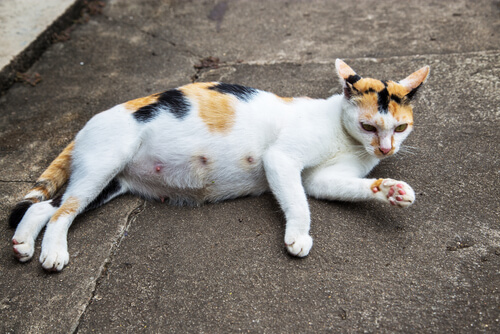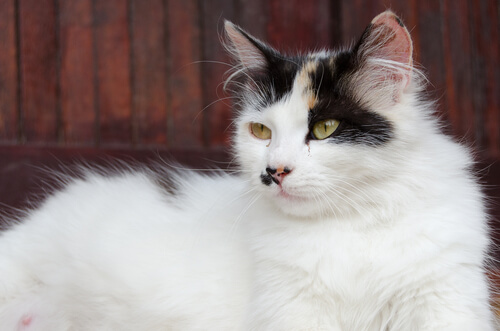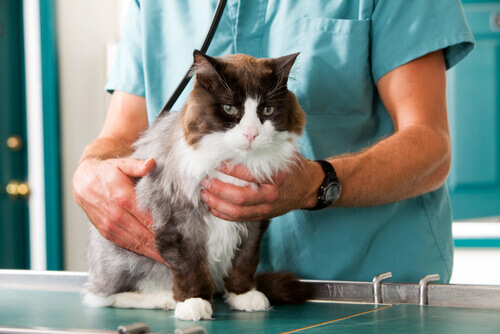How to Feed a Pregnant Cat

The diet of a pregnant cat is decisive for the healthy fetal development of its kittens. In fact, it’s very important to feed a pregnant cat properly to avoid putting her health at risk before, during, and after giving birth.
Below, we’ll talk to you about the nutritional needs of your pregnant cat and some tips to help you feed it correctly.
The nutritional needs of a pregnant cat
A pregnant cat needs to eat a protein-rich diet. In addition to staying healthy, her body must get the necessary nutrients for her kittens to develop properly. From a nutritional standpoint, this means you must feed her more calories to allow her body to produce energy.
However, this caloric intake must consist of the essential nutrients the pregnant cat needs. It isn’t a good idea to feed a pregnant cat excess carbohydrates to make sure she gets extra calories. This is because the carbohydrates will basically produce sugar, and not the nutrients she and her kittens need.
The extra calories should mainly come from animal protein sources. For example, beef, chicken, organ meats, seafood, eggs, dairy products, etc. In addition, you must increase her daily calcium intake, as this mineral is vital for fetal development.
Unlike female dogs, pregnant cats have difficulty maintaining a body fat percentage of about 25%. This is the level that allows the production of breast milk with adequate nutrients. Therefore, while pregnant, her diet should be richer in healthy fats to prepare her for breastfeeding.

What’s the best way to feed a pregnant cat?
The safest way to meet your cat’s nutritional needs is to offer her a commercial cat food for kittens. These balanced cat foods offer the right ratio of all essential nutrients for the pregnant cat and her little kittens.
In addition, there’s no risk for the kittens if they eat the cat food from their mother’s bowl. This is essential during the weaning period, when the kittens prepare to give up their mother’s milk and eat solid food.
If you choose to feed a pregnant cat with commercial cat food, remember to always choose an excellent quality one. Premium cat food contains high-quality and easily digested dehydrated meats, which are well-assimilated by the body.
On the other hand, low-quality cat food is harmful for pets, especially for kittens and pregnant cats. Most of them are low in animal protein and high in cereals, such as corn, rice, or soybeans, which can lead to poor nutrition and many gastric problems, such as excess gas.
How much should a pregnant cat eat?
Pregnant cats tend to have no qualms when it comes to eating. Their appetite increases during pregnancy to meet their body’s nutritional needs. After delivery, you’ll probably notice her appetite gradually decreasing until it eventually normalizes.
Therefore, you must put some tricks into practice to feed your pregnant cat. For example, the female should have the cat food available to her throughout the day, so she can eat whenever she wants. This way, she’ll go to her bowl and eat the amount she needs to satisfy her hunger and get energy.

In addition to the above, regular veterinary check-ups will be essential to control the female cat’s weight gain. In addition, it’s essential to verify the adequate growth of the kittens that are in the pregnant cat’s belly.
The body weight of the pregnant cat
As you can see, it’s essential to control the cat’s weight throughout the entire pregnancy. It’s also important for the female to have a healthy weight before becoming pregnant.
Malnutrition and excess weight can lead to many complications during pregnancy and at the time of delivery. Therefore, you must feed your cat a balanced diet throughout her life.
In addition, it’s crucial to provide adequate preventive medicine, regardless of your cat’s age or breed. This is because different illnesses and malformations can be caused by conditions that the cat transmits to her kittens.
In terms of your cat’s health, you have to watch the vaccination schedule and deworming calendar and take her to the vet for a checkup every six months.
Finally, we must highlight the importance of being a responsible pet owner. Experts highly recommend neutering cats to avoid street overcrowding and the transmission of highly contagious diseases.
